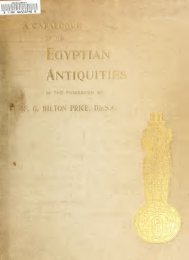Historical studies
Historical studies
Historical studies
Create successful ePaper yourself
Turn your PDF publications into a flip-book with our unique Google optimized e-Paper software.
l8<br />
36. We can now review the various stages of the<br />
two Semitic conquests of Egypt, and compare the<br />
length of their periods ; the first conquest is stated as<br />
recorded by Manctho, the second conquest being since<br />
his time cannot therefore have had any possible<br />
influence on his record.<br />
We see below how closely parallel the history of<br />
B.C.<br />
3293 xiii dynasty^<br />
2640 xiv „ J Decay during .<br />
!540<br />
2256<br />
1738<br />
THE LENGTH OF EGYPTIAN HISTORY<br />
Egypt has been under the two great Semitic invasions.<br />
There has never been a difference in the main events<br />
of more than a generation along the two scales. And<br />
as the later Semitic conquest is unquestionable in its<br />
historic outlines, so the earlier conquest is by this<br />
comparison rendered historically probable in its<br />
general features.<br />
xvii dynasty, Berber conquest until Turkish conquest until<br />
C<br />
•j A.D.<br />
B.C. Interval.<br />
30 3263<br />
I 640 3280<br />
750 3290<br />
I02I 3277<br />
1517 3255<br />
1530 Conquest of Syria by Tahutmes I. 208 254 Conquest of Syria by Aly Bey 1771 3301<br />
I48c^ Main conquest<br />
hutmes III<br />
of<br />
.<br />
Syria<br />
.<br />
by<br />
.<br />
Ta-<br />
.<br />
c 50<br />
\to 71<br />
6o|<br />
to 68/<br />
Main conquest ^ by Ibrahim<br />
'^^'<br />
.(<br />
U1839<br />
^^^<br />
3300<br />
146<br />
1<br />
100 years confusion<br />
XV dynasty great kings<br />
xvi dynasty lesser kings<br />
T/ie Value of Manetho.<br />
Years. Years.<br />
37. When we possess a history of a highly<br />
civilised country, which maintained a continuous<br />
chronology, and this record was drawn up by a native<br />
who was a skilled writer, and who was likely to know<br />
of all available sources of information, we need very<br />
strong evidence to warrant us in setting it aside. It<br />
cannot be treated as if it had no weight, and as if we<br />
might reject any part of it on vague suppositions.<br />
Some stronger and more decisive evidence is needed,<br />
before we can venture to adopt a different view to that<br />
of the general belief of the native scholars during long<br />
ages.<br />
Unfortunately the history of Manetho, written<br />
early in the Ptolemaic period, has perished in its<br />
original form, and we only possess brief lists of kings<br />
extracted by later writers. The best of these is<br />
Julius Africanus, 221 A.D., and inferior is Eusebius,<br />
326 A.D., known in Greek and in an Armenian<br />
version. The material is therefore only secondhand<br />
; and the continual discrepancies between the<br />
extracts, and between the items and totals in each<br />
author, shew how much the text has suffered in its<br />
details.<br />
What should be the appreciation of a work which<br />
has been thus injured ? Errors of miscopying of<br />
637 670 Decay under Roman rule<br />
100 no Omayj'ad rulers.<br />
284 271 Great khalifahs.<br />
518 497 Lesser rulers.<br />
Average interval 3285<br />
years will affect an item or a total, but will not change<br />
both ; and happily there has not been an editor who<br />
has tried to reconcile the items and totals. Then it is<br />
obvious that no very large addition could be made to<br />
a reign, or it would be abnormal. Thus, although<br />
many casual errors might be made, they would prob-<br />
ably tend to balance each other, and not being of very<br />
large amounts the total would probably remain much<br />
the same. No corruption that is not made for a pur-<br />
pose will alter the scale of a history to any great extent.<br />
We should expect to find then that, though every<br />
single item might be proved to have suffered some<br />
corruption, yet the totals would not be very far from<br />
the truth.<br />
38. We will now see how far the general periods<br />
of Manetho are in agreement with other informa-<br />
tion that we have, starting from the latest period as<br />
being the best known.<br />
From Alexander's conquest of Egypt back to that<br />
of Cambyses, the interval is given by Manetho as<br />
xxxi dynasty 9 years<br />
XXX 38<br />
xxix 20<br />
xxviii<br />
6<br />
xxvii<br />
121<br />
194 years

















